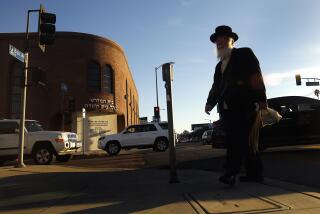PASSOVER CELEBRATION : Instructional Seder will explain the holiday.
- Share via
Teachers, clergy and people of all beliefs are invited to celebrate the Jewish holiday of Passover at an instructional Seder service to be hosted by the South Bay-Harbor Inter-Religious Council at 4:30 p.m. Sunday at Temple Beth El in San Pedro.
The event offers a special opportunity to understand this Jewish holiday and a chance to discuss and celebrate such universal themes as freedom and redemption, said Rabbi David Lieb, who will conduct part of the Passover ceremony.
“While the Passover Seder is a unique Jewish experience and must be understood in the context of Jewish history, it does have messages of universal significance,” Lieb said.
This year, Passover, or Pesach, begins at dusk April 5. Considered by some the most important Jewish holiday, it commemorates the event that finally forced the Egyptian Pharaoh Ramses II to free the Israelites from bondage.
As recounted in the Bible, God sent the angel of death to claim the firstborn of every Egyptian household. Jewish households, identified by a marking of lamb’s blood on the doorway, were “passed over” by death and their children saved. Once freed from slavery, the Jews, led by Moses, fled Egypt for the promised land of Canaan.
Seder is the ritual meal that commemorates this exodus. It takes place on the first night of the seven-day Passover celebrated by Reform Jews and on the first and second nights of the eight-day holiday celebrated by Conservative and Orthodox Jews.
The word Seder, from the Hebrew sedher , means order or division and indicates the degree of ceremony followed during the highly traditional meal.
Participants in Sunday’s Seder will be educated on the significance of the holiday and partake in Passover customs such as special readings and symbolic foods. The ceremonial foods, each symbolizing part of the Israelites’ history, include matzo, bitter herbs and lamb.
Matzo is important because when the Israelites were forced to flee Egypt, they had no time to let yeast rise and had to bake bread without it. The unleavened bread symbolizes their haste in leaving Egypt, Lieb said.
Bitter herbs mark the bitterness of slavery, and lamb is served to commemorate how the animal’s blood was used to mark the homes of Israelites during the first Passover.
The first Seder was held during the reign of Pharaoh Ramses II about 1250 BC and began as a religious service sometime around the 7th or 8th Century BC, Lieb said. Jews began to celebrate Seder in the home during Roman times around the 1st or 2nd Century BC.
Throughout the centuries, the Seder meal has been a time for reflection and discussion, Lieb said. Somehow, the lessons of Passover have remained constant.
“There’s always a Pharaoh and there’s always a slave who needs freeing,” he said. “There’s always a God who intervenes.”
The event is of special interest to parents, clergy, religious school teachers and administrators but is open to the general public.
A donation of $3 for adults and $2 for children under 12 is requested. Temple Beth El is located at 1435 W. 7th St. in San Pedro. For more information call (310) 833-2467.
More to Read
Sign up for Essential California
The most important California stories and recommendations in your inbox every morning.
You may occasionally receive promotional content from the Los Angeles Times.













